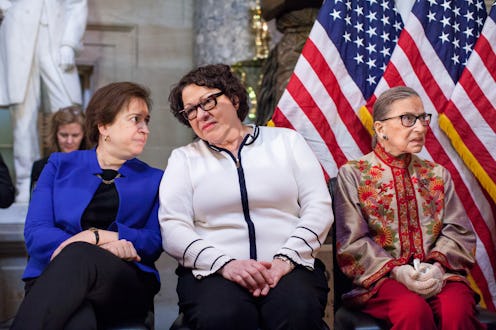News
Elena Kagan & Sonia Sotomayor Schooled The Cakeshop Owner Who Refuses To Serve Gay People

In July 2012, a Colorado bakery owner refused to make a cake for a gay couple because it supposedly violated his religious beliefs. Now, more than five years later, Supreme Court Justices Sonia Sotomayor and Elena Kagan are schooling Masterpiece Cakeshop owner Jack Phillips with some blistering remarks that defined Tuesday's much-anticipated hearing.
Much of the case, Masterpiece Cakeshop v. Colorado Civil Rights Commission, hinges on the notion of free speech (the ACLU, who is defending the gay couple, has insisted that it hinges largely on discrimination). Though this particular dispute dominated the hearing on Tuesday, Justice Sotomayor quickly pared the issue down by putting it into historical perspective, noting that societal change doesn't happen "on its own."
Counsel, the problem is that America's reaction to mixed marriages and to race didn't change on its own. It changed because we had public accommodation laws that forced people to do things that many claimed were against their expressive rights and against their religious rights.
It's not denigrating someone by saying, as I mentioned earlier, to say: If you choose to participate in our community in a public way, your choice, you can choose to sell cakes or not. You can choose to sell cupcakes or not, whatever it is you choose to sell, you have to sell it to everyone who knocks on your door, if you open your door to everyone.
In response, attorney Kristen Waggoner, representing Phillips, cited the First Amendment.
The First Amendment prohibits the government from forcing people to express messages that violate religious convictions. Yet the Commission requires Mr. Phillips to do just that, ordering him to sketch, sculpt, and hand-paint cakes that celebrate a view of marriage in violation of his religious convictions.
Waggoner contended that the cakes created by her client (described as"highly-sculpted" and "stylized" by Solicitor General Noel Francisco, another lawyer for the petitioners) should be protected in the same way that works of art are — Kagan, however, wasn't buying it. And when Waggoner argued that a baker is engaged in "speech" when he bakes a cake but a chef is not when he cooks a meal, Kagan laid into the double standard.
"Woah, the baker is engaged in speech, but the chef is not engaged in speech?" Kagan replied, adding that refusing to bake a cake for a gay couple — and citing free speech to do so — was a slippery slope. It assumes, she suggested, that makeup artists, jewelers, or hair stylists can refuse to take gay clients too — and do so under the protection of free speech.
David Mullins and Charlie Craig, who were initially denied the cake, have also hit back at the defense that the baker was exercising his right to expression. In an interview with CNN, Craig said the case "isn't about artistic expression."
I don't feel like we asked for a piece of art, or for him to make a statement, we simply asked him for a cake, and he denied that to us simply because of who we are.
Those critical of Masterpiece Cakeshop's refusal to bake a cake for a same-sex couple argue that a ruling in favor of Masterpiece would wedge open the door to more widespread discrimination. During Tuesday's arguments, Kagan and Sotomayor weren't the only justices who expressed similar concerns.
Justice Anthony Kennedy wondered aloud that, if the baker were to prevail, could he then "put a sign in his window, 'We do not bake cakes for gay weddings?'" Though the question ultimately went unanswered, it didn't stop Sotomayor from jumping in to ask how such a ruling might impact same-sex couples in the future.
We've always said in our public accommodations law we can't change your private beliefs ... but if you want to be a part of our community, of our civic community, there's certain behavior, conduct [that] you can't engage in.And that includes not selling products that you sell to everyone else to people simply because of their race, religion, national origin, gender, and, in this case, sexual orientation.
Reports suggest not all Supreme Court justices are on the same page in this case, making its outcome uncertain. And though it may be far from over, those who consider Phillips' actions discriminatory can count on Sotomayor and Kagan to steer the conversation in the right direction.